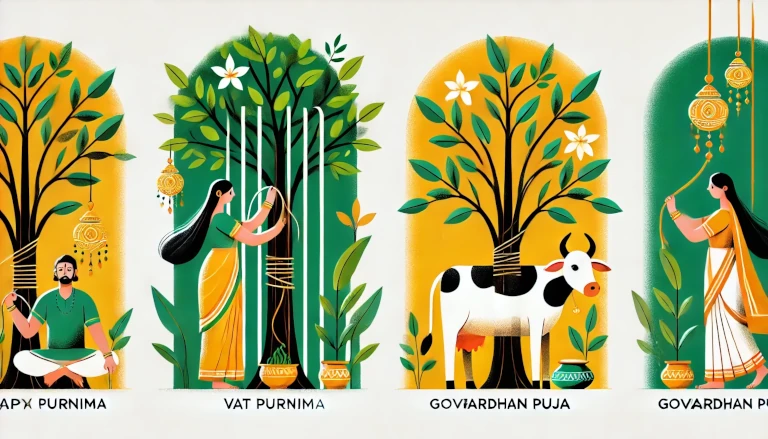Hinduism is a religion deeply rooted in nature. For thousands of years, Hindu festivals have been celebrated not just for their religious significance, but also as a way to honor and protect the environment. Our ancestors, through these festivals, emphasized the importance of living in harmony with nature, understanding that human life depends on maintaining the ecological balance.
In this blog, we will explore the idea behind starting Hindu festivals, focusing on how our ancestors designed them to promote environmental protection and sustainability.
1. Harmonizing with Nature 🌿🌳
The idea behind many Hindu festivals is the recognition of the interconnectedness between humans and nature. Our ancestors understood that humans are just a small part of a larger ecosystem, and they created festivals that celebrate nature’s bounty, helping to build a close relationship with the natural world.
For example, the festival of Makar Sankranti celebrates the sun’s movement into the Capricorn zodiac, marking the change of seasons and the harvest time. This festival encourages gratitude for the sun’s energy, which sustains all life on earth. It also promotes the use of seasonal and natural foods like sesame and jaggery, which are not only healthy but also grown in harmony with nature.
2. Respect for Water Bodies 🌊💧
Water is a sacred element in Hinduism, and many festivals revolve around the importance of water conservation and cleanliness. Our ancestors recognized that rivers and lakes are vital sources of life, and festivals like Chhath Puja and Ganga Dussehra are dedicated to honoring rivers, particularly the Ganga, which is seen as a goddess.
These festivals remind people of the sacredness of water and promote the idea of keeping water bodies clean and pollution-free. Rituals involve offering water to the gods and goddesses, symbolizing the flow of life and the need to protect these natural resources.
3. Promoting Biodiversity and Wildlife Conservation 🐍🌾
Many Hindu festivals are designed to protect and celebrate biodiversity. Nag Panchami, for example, is a festival dedicated to the worship of snakes. In Hindu mythology, snakes are revered as protectors of the earth, and they play a crucial role in controlling pests and maintaining ecological balance.
By honoring animals like snakes, elephants (during Ganesh Chaturthi), and cows (during Govardhan Puja), our ancestors aimed to teach future generations the importance of protecting wildlife. These festivals promote the idea of coexistence with animals and emphasize the need for biodiversity conservation.
4. Sustainable Agriculture and Farming Practices 🌾🚜
Agriculture has always been at the heart of Hindu festivals. Many festivals, such as Pongal and Baisakhi, are directly connected to the harvest and agricultural cycles. These festivals celebrate the relationship between farmers and the land, reinforcing the importance of sustainable farming practices.
During festivals like Pongal, offerings are made to the earth, cattle, and the sun, expressing gratitude for the abundance of crops. These festivals highlight the importance of sustainable farming and respect for the land, which in turn supports the idea of food security and the responsible use of natural resources.
5. Eco-Friendly Rituals and Practices 🕯️🌍
Our ancestors were mindful of the impact that festivals could have on the environment. Many traditional Hindu festivals involved eco-friendly practices, such as using natural materials for rituals. For instance, during Diwali, oil lamps (diyas) were traditionally made from clay and used oil as fuel, minimizing environmental harm.
Today, many of these rituals are being revived as part of green festivals, where the use of plastic and chemicals is being replaced by natural, biodegradable materials. Ganesh Chaturthi, for example, has seen a shift towards using eco-friendly idols made from clay instead of plaster of Paris, which does not pollute water bodies during the immersion ceremony.
6. Tree Worship and Conservation 🌳🌱
Hindu festivals have also placed great emphasis on the importance of trees. Tulsi Vivah celebrates the Tulsi plant, which is revered for its medicinal and spiritual properties. The festival involves planting and nurturing Tulsi plants, symbolizing the connection between humans and plants and the need to protect trees and the environment.
During festivals like Vat Purnima, women worship the Banyan tree, which is seen as a symbol of longevity and strength. These festivals teach the importance of tree conservation and the role trees play in maintaining the ecological balance by providing shelter, food, and oxygen.
7. Cycles of Nature and Renewal 🌸🌼
Many Hindu festivals are linked to the seasons and natural cycles, reinforcing the need to align our lives with nature’s rhythms. Vasant Panchami celebrates the arrival of spring, encouraging the planting of trees and flowers to support the renewal of life.
The cyclic nature of Hindu festivals emphasizes the idea of renewal and sustainability, reminding us that we must take care of the environment so that it continues to sustain us for generations to come.
8. Living in Harmony with the Five Elements (Pancha Bhoota) 🔥💧🌍🌬️
Hindu philosophy teaches the importance of the five elements (earth, water, fire, air, and space) in sustaining life. Many festivals incorporate rituals that honor these elements, encouraging the mindful use of natural resources.
For example, the Yajna (sacred fire ritual) represents fire, while offerings to rivers during festivals like Ganga Dussehra represent water. These practices encourage people to be mindful of their interaction with the natural elements and the need to protect them.
Conclusion: The Wisdom of Our Ancestors in Protecting the Environment 🌍🕉️
The Hindu festivals initiated by our ancestors are not just religious celebrations—they are deeply rooted in the protection and conservation of nature. Through these festivals, our ancestors passed down valuable lessons about environmental sustainability, teaching us the importance of living in harmony with nature and preserving our natural resources for future generations.
By embracing these ancient practices today, we can continue to protect our environment, reduce our ecological footprint, and ensure a healthier planet for all.
Discover more from Green Ecosystem - Renewable Energy, Agriculture, and Environmental Sustainability
Subscribe to get the latest posts sent to your email.


